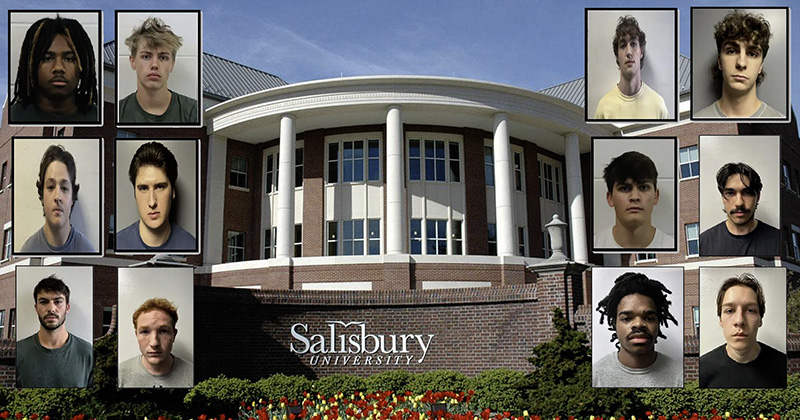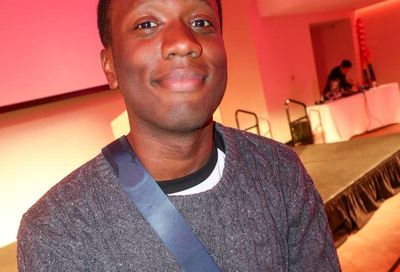Hate Crime Conviction Upheld by Iowa Supreme Court
The court upheld the hate crime conviction of a man who left harassing notes at homes displaying Pride flags.

The Iowa Supreme Court affirmed the hate crime conviction of a man who posted handwritten notes at homes with rainbow flags, emblems, and decorations, urging them to “burn that gay flag.”
Robert Clark Geddes, of Boone, Iowa, was charged and convicted on five counts of trespassing as a hate crime for leaving notes on several different homes with Pride flags, rainbow-colored doormats, or other displays or symbols typically associated with support for the LGBTQ community.
The notes all said “burn that gay flag,” and one contained additional anti-gay slurs.
Police connected Geddes, who was captured leaving the note by a Ring doorbell camera at one of the residences, to the other incidents because all the notes had “consistent handwriting, matching paper tear marks, and marker bleed through each page.”
After facing five counts of trespassing as a hate crime — and having five counts of harassment dropped in exchange for not requesting a jury trial — Geddes was convicted and sentenced to up to two years of probation.
He subsequently appealed his conviction, arguing that prosecutors had failed to prove he targeted people who were LGBTQ or had a connection to the community. As a result, he claimed his conviction violated his free speech rights, reports the Associated Press.
Under Iowa law, a hate crime conviction requires proof that a defendant targeted a victim because of their “race, color, religion, ancestry, national origin, political affiliation, sex, sexual orientation, age, or disability,” or because of their “association with” people in those categories.
The majority of the Iowa Supreme Court rejected the appeal on a 6-1 vote, noting that the rainbow flag has come to symbolize support for LGBTQ rights.
The majority also rejected the argument that there was not sufficient evidence to convict Geddes of a hate crime.
“There is no evidence to indicate whether the recipients of Geddes’s notes were themselves members of the LGBTQ+ community or whether Geddes believed they were. The issue thus boils down to whether Geddes targeted his victims because of their ‘association with’ persons of a particular sexual orientation,” Justice Edward Mansfield wrote on behalf of the court.
“The issue here is not the meaning of the word ‘association’ standing alone, but the meaning of the entire phrase ‘because of . . . the person’s association with a person of a certain . . . sexual orientation,'” Mansfield continued. “This wording places the focus on whether the victim was targeted because of their association, not the degree of association.
“One can have ‘association with’ persons of a protected class without being part of a formal association. Indeed, Geddes perceived the property owners and lessees that way. He trespassed because he objected to their flags or flag decals, and he objected to them because they were ‘gay’ flags — to quote his terminology. In other words, Geddes connected the property owners and lessees in his own mind to people who were gay.”
Justice Matthew McDermott argued, in a dissent, that there was no evidence in the record proving affirmatively whether those targeted by the notes were LGBTQ, or whether Geddes believed they were — appearing to target the very concept of what constitutes a hate crime.
“As a symbol, a flag doesn’t independently create or express actual association with particular persons,” McDermott wrote. “One can own and display a Pride flag without having any association with another person. … It’s speculation to say that everyone who displays a Pride flag is actually associated with millions of people around the world — or some unidentified subset of them — who identify as LGBTQ+.”
Support Metro Weekly’s Journalism
These are challenging times for news organizations. And yet it’s crucial we stay active and provide vital resources and information to both our local readers and the world. So won’t you please take a moment and consider supporting Metro Weekly with a membership? For as little as $5 a month, you can help ensure Metro Weekly magazine and MetroWeekly.com remain free, viable resources as we provide the best, most diverse, culturally-resonant LGBTQ coverage in both the D.C. region and around the world. Memberships come with exclusive perks and discounts, your own personal digital delivery of each week’s magazine (and an archive), access to our Member's Lounge when it launches this fall, and exclusive members-only items like Metro Weekly Membership Mugs and Tote Bags! Check out all our membership levels here and please join us today!























You must be logged in to post a comment.